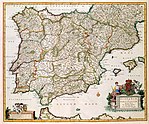
Back إصلاحات البوربون Arabic Reformismu borbónicu AST Reformisme borbònic Catalan Μεταρρυθμίσεις των Βουρβόνων Greek Reformismo borbónico Spanish Borboien erreformismoa Basque Réformes bourboniennes French הרפורמות הבורבוניות HE Reformasi Bourbon ID Riforme borboniche Italian
| History of Spain |
|---|
 |
| Timeline |
The Bourbon Reforms (Spanish: Reformismo borbónico, lit. 'Borbonic reformism') consisted of political and economic changes promulgated by the Spanish Crown under various kings of the House of Bourbon, mainly in the 18th century. The beginning of the new Crown's power with clear lines of authority to officials contrasted to the complex system of government that evolved under the Habsburg monarchs.[1] For example, the crown pursued state predominance over the Catholic Church, pushed economic reforms, and placed power solely into the hands of civil officials.[2]
The reforms resulted in significant restructuring of administrative structure and personnel.[3] The reforms were intended to stimulate manufacturing and technology to modernise Spain. In Spanish America, the reforms were designed to make the administration more efficient and to promote its economic, commercial and fiscal development. When looking at the material effects of how the Bourbon Reforms aimed to change the relationship between the Spanish American colonies and the Crown, it can be said that the reforms functionally aimed to transform juridically semi-autonomous groups into proper colonies. Specifically, the reforms sought to increase commercial agriculture and mining and increase trade. The system was intended to be much more hierarchal, forcing the colonies to become more dependent on Spain and serve as a market for their manufactured goods. The crown ordered these changes in hopes that it would have a positive effect on the economy of Spain.[2] Furthermore, the Bourbon Reforms were intended to limit the power of Criollos and re-establish peninsular supremacy over the colonies.[4]
The reforms achieved mixed results administratively but succeeded in alienating the local elites of the Americas (who called themselves Criollos) and eventually led to the independence of all overseas dominions of the Spanish crown.[5] This is not to say that a clean and straight line can be drawn from the Bourbon reforms to the movements for Independence, but rather that the period of unrest that came in the wake of the reforms helped encourage the conditions necessary for local riots, and eventually revolts.
- ^ James Lockhart and Stuart B. Schwartz, Early Latin America. New York: Cambridge University Press 1983, p. 347.
- ^ a b Burkholder, Mark A. (2019). Colonial Latin America. Johnson, Lyman L. (Tenth ed.). New York: Oxford University Press. p. 316. ISBN 978-0-19-064240-2. OCLC 1015274908.
- ^ James Lockhart and Stuart Schwartz, Early Latin America. Cambridge: Cambridge University Press 1983, p. 347.
- ^ Ortega Noriega, Sergio. "Las reformas borbónicas y la Independencia, 1767–1821" Archived November 25, 2005, at the Wayback Machine, Breve historia de Sinaloa. Mexico, 1999. ISBN 968-16-5378-5
- ^ "The Bourbon Reforms" Archived October 26, 2015, at the Wayback Machine
© MMXXIII Rich X Search. We shall prevail. All rights reserved. Rich X Search
